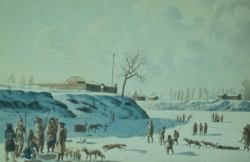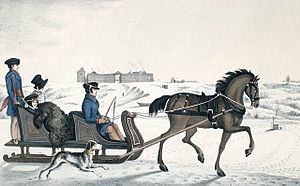Fort Gibraltar facts for kids
Quick facts for kids Fort Gibraltar |
|
|---|---|
| Winnipeg, Manitoba | |

The fort at the confluence of the Red and Assiniboine rivers in 1821 by Peter Rindisbacher
|
|
| Type | Fort |
| Site information | |
| Controlled by | North West Company |
| Site history | |
| Built | 1809 |
| In use | 1809-1821 |
| Battles/wars | Pemmican War Battle of Seven Oaks |
| Official name: Forts Rouge, Garry, and Gibraltar National Historic Site of Canada | |
| Designated: | 1924 |
Fort Gibraltar was an important trading post built in 1809. It was founded by the North West Company in what is now Manitoba, Canada. The fort was located where the Red River and Assiniboine River meet. This area is now known as The Forks in the city of Winnipeg.
In 1821, the North West Company joined with another company. Fort Gibraltar was then renamed Fort Garry. Later, in 1835, it became known as Upper Fort Garry.
Contents
History of Fort Gibraltar

In the early 1800s, the fur trade was a very big business in Western Canada. Two main companies were competing fiercely for control of this trade.
One company was the Hudson's Bay Company. It was based in London, England. The other was the North West Company, based in Montreal. The Hudson's Bay Company had a very English style. The North West Company was a mix of French, Scottish, and First Nations cultures.
The fur traders of the North West Company were called voyageurs. They traveled a lot and set up temporary camps. These camps were in the area where Winnipeg is today.
Building the Forts
In 1809, the North West Company built Fort Gibraltar. A short distance north, another fort was built. This was Fort Douglas, started in 1813 and finished in 1815. It was built by settlers and employees of the Hudson's Bay Company.
There were many fights between the two companies. The Hudson's Bay Company employees were mostly Scottish. The North West Company employees were mainly French-Canadians and Métis. These conflicts were part of what was known as the Pemmican War.
Fort Gibraltar's Capture and Rebuilding
On March 17, 1816, Fort Gibraltar was captured. Robert Semple, the new Governor of the Red River Colony, ordered its destruction. However, British authorities later said this action was against the law.
So, the North West Company was allowed to rebuild the fort. They finished rebuilding it in 1817.
On March 26, 1821, the North West Company and the Hudson's Bay Company merged. They became one large company under the Hudson's Bay Company name.
A National Historic Site
The area where Fort Gibraltar once stood is very important. In 1924, it was named a National Historic Site. It is part of the "Forts Rouge, Garry, and Gibraltar National Historic Site of Canada".
Timeline of Fort Gibraltar
- 1809: The North West Company builds Fort Gibraltar.
- 1816: Fort Gibraltar is captured and destroyed by the Red River Colony.
- 1817: Fort Gibraltar is rebuilt by the North West Company.
- 1821: The North West Company merges with Hudson's Bay Company. Fort Gibraltar continues to operate under the new company.
- 1822: Fort Gibraltar is renamed Fort Garry.
- 1835: Fort Garry is rebuilt after a big flood in 1826. It is then called Upper Fort Garry.
Fort Gibraltar Museum
Today, you can visit a reconstructed Fort Gibraltar. It is located in Parc Whittier Park in St. Boniface, Winnipeg. This new fort was built in the late 1970s. It was created for the Festival du Voyageur. This festival is the biggest winter festival in Western Canada.
In the summer, the museum offers special demonstrations. These show what life was like at a fur trading post in 1815.
Fort Gibraltar is at 866 rue St Joseph Street. It hosts the yearly winter Festival du Voyageur. It also holds events through Fort Catering.
 | William Lucy |
 | Charles Hayes |
 | Cleveland Robinson |

